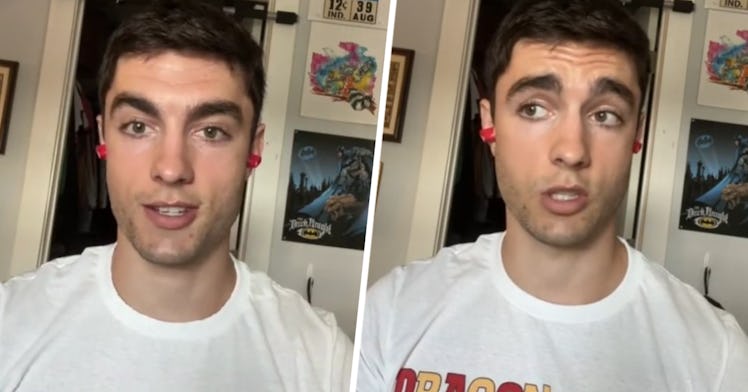This Guy's Viral TikTok About Why He Got A Vasectomy Is A Must-Watch
Keith Laue, a 23-year-old content creator from Texas, has gone viral on TikTok after discussing his decision to have a vasectomy and documenting his entire process.

A 23-year-old content creator from Texas has gone viral on TikTok after discussing his decision to have a vasectomy and the process. Keith Laue took viewers through the entire process of a vasectomy, from a pre-appointment phone call through healing time. His willingness to be so transparent is important for several reasons. Here's what you need to know.
Keith's decision to share his journey to getting a vasectomy might seem like it's treading the line of TMI, but it’s actually mightily refreshing. For one, when we talk about vasectomies in popular culture, depictions of the procedure tend to focus on pain — and can muddy the water of what's typical in terms of pain and recovery time.
For Keith, it was necessary to share his experience to debunk many myths surrounding the procedure. It’s great to hear him discuss the importance of both parties of a relationship being a part of birth control discussions if their partner has a chance of ever becoming pregnant.
According to the Mayo Clinic, a vasectomy is a form of birth control "that cuts the supply of sperm to your semen” that comes with a "low risk of problems and can usually be performed in an outpatient setting under local anesthesia."
Fatherly notes that vasectomies are not major surgery, but “it’s not like getting a cavity filled, either.”
And that sounds pretty close to what Keith's experience was. In his video, he explained the process, including setting up an appointment and what recovery was really like. "So, I got a vasectomy a couple of weeks ago, and I wanted to walk y'all through the process, just in case you were considering getting one yourself," Keith shared in the video, which now has more than 3 million views on TikTok.
"It started with a phone consultation. It was super easy. They set the appointment for a couple of weeks out. They answered any questions I had," he said, adding that the procedure, in total, only took 15 minutes. "On that day, I got valium for anxiety. Walking in, I got local anesthesia. I was awake the whole time for the procedure, which was weird but it only lasted 10 to 15 minutes. It wasn't that bad."
For recovery, Keith said that he was told that he would need to rest for about a week before he could return to his typical activity level. Over-the-counter medications comfortably managed his pain. "I basically didn't really work out for a week. The first three days, I used a lot of heavy ibuprofen, icing," he shared. "Didn't really move much, but after that, I was pretty good to go and do everything."
Vasectomies are reversible, and for some couples, may be a more practical option for birth control than, say, hormone-based birth control or tubal litigation, a procedure that is more expensive and invasive than the vasectomy process.
Data shows that a vasectomy reversal is possible. Still, the success of a reversal leading to a pregnancy varies depending on several factors, including how long it's been since the vasectomy was performed.
According to the NHS, the success rate of a vasectomy reversal leading to pregnancy is 75% if it's within 3 years since the vasectomy, up to 55% after 3 to 8 years, and 40% after 9 to 14 years of a vasectomy.
Speaking to Buzzfeed, Keith said there were several reasons why he and his partner decided a vasectomy was the best birth control option. "After the heartbeat bill got passed in Texas, and then the Supreme Court picked up Roe v. Wade, my partner started talking to me about getting a vasectomy, and I had to think about it for a couple of months," he said. "I don't think any guy enjoys thinking about getting his balls cut, but it seemed to be the easiest long-term option for birth control."
He continued, "Some additional reasons were that we already have a daughter, and if we're in a place to have more kids, we will happily foster. I have insurance and my partner does not. It's much harder for my partner to get her tubes tied or to get an IUD than it is for me to get a vasectomy. The Supreme Court has made women's healthcare unsafe and unreliable, and it's better for my partner to not be anxious about it."
Keith also said that he believes more men need to step up and "share the weight of birth control." He added, "I know the thought of getting your nads snipped can be really anxiety-inducing, but it's way less nerve-wracking than an unwanted pregnancy."
This article was originally published on